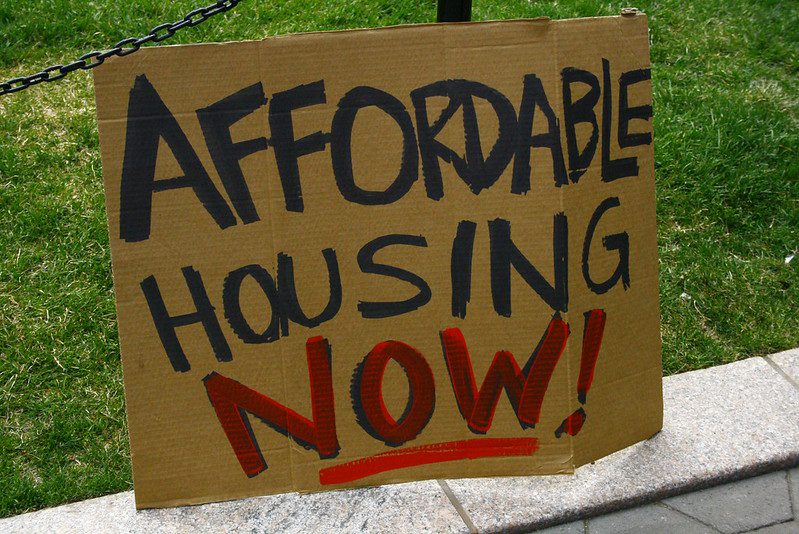“You can’t get an apartment if you were evicted,” said the broker before she hung up on me. “The reason doesn’t matter.”
I had already been refused two apartments because my landlord had booted me. I appealed the case in court, but lost. After the decision was handed down, we had precious little time to escape with as many of my family’s treasured possessions as we could grab before the marshals swept down on us.
But in trying to find a new home, we faced a new question on the landlord boilerplate: “Have you ever been in Housing Court?” No space was available for the reason or for the outcome. Our mere presence on the court calendar was sufficient to deny us an apartment.
Suppose I said that I had never been in Housing Court. Wouldn’t work. There are at least two databases now on the Internet to supply that information, gleaned from public records, to landlords. Only owners or Realtors—who must supply a deed or an active license—may subscribe. In addition to appearances in Housing Court, the databases provide credit checks. Consumer law requires them to send copies of their reports to prospective tenants, with a way for the subject to refute the data.
The most popular database is the New American Registry (www.residentscreening.com), known as “the Registry” in the industry. Another is American Tenant Service, ATS. The Web pages show that they invite landlords to supply additional information on tenants, such as identifying alleged “troublemakers,” without giving tenants a clear and definite opportunity for rebuttal.
ATS called my case an “eviction” three years before I lost. The Registry more accurately identified me simply as the defendant, but failed to show that the case had nothing to do with nonpayment. With marshals circling my door, the time and effort for formal rebuttal made such protection moot.
Landlords are surely not looking only for deadbeat tenants; a simple credit report would turn them up. A name on the Housing Court calendar reveals nothing about creditworthiness. Does the tenant tend to question the landlord’s orders? That’s what the landlord wants to know. In our case, the landlord ordered us out, claiming I could not succeed my mother. I disputed that opinion, and it took the courts five years to decide who was right. But in searching for a new home, I found myself blacklisted for not vacating voluntarily to spare the landlord the burden of proving the case in court.
In other cases, a tenant may have taken the landlord to court for gross violations and even won. But in looking for a new home, such renters would find themselves shut out simply for upholding the law. Landlords don’t want tenants who fight for their rights.
“Blacklisting, discrimination, exorbitant rents, poor service, unsanitary housing, oppressive leases, are some of the recognized evils which can be ameliorated if not eliminated by an effective association of tenants.” The Hon. J. Levy, of the Bronx Municipal Court, wrote that in 1938, when there was no Housing Court. An African- American tenant—identified only as the wife of the defendant, James Coulter—had started such a activist group in her tenement. She and her family were evicted for her trouble. She became so well known in her community that no other landlord would rent to her. Agreeing that she was blacklisted for her activism, not her skin color, Judge Levy gave her an extra six months to find a new home.
In 1962 William F. Buckley sued the president of Hunter College for citing his political views as reason to deny him rental of a meeting hall. The court ruled that, unlike a profit-seeking landlord, a municipal college president may not restrain free speech. Small help to anyone who needs a home, not a campus meeting hall!
However, a significant, but indirect, blow to blacklisting was delivered by the Supreme Court in 1972. In Trafficante v. Metropolitan Life, two tenants sued a landlord for discriminating against African-Americans, alleging injury to their reputation in the community and to their social and professional opportunities. The lower courts ruled that only an African-American plaintiff who had been denied an apartment had the legal standing to bring such a suit. Existing tenants could not object to refusal to rent to others.
The Court unanimously overturned those rulings. “The person on the landlord’s blacklist,” wrote Justice William O. Douglas, “is not the only victim of discriminatory housing practices; it is…the whole community.” While the case was only about the Civil Rights Act of 1968—not the First Amendment—the justice’s reasoning could be held to extend the Buckley decision to include private landlords. Systematic, unjust exclusion deprives existing tenants of good neighbors.
So far, no one has yet used the case law, skimpy as it is, for a definitive lawsuit to stop blacklisting. Home-hunters rely on civil-rights groups to protect them from discrimination by race, gender, marital status, disability, or sexual orientation.
But, although the law protects existing tenants from retaliatory eviction, there is no statute to stop blacklisting prospective tenants for political action or corrective litigation. Realtors and managers are taking gleeful advantage of that gap. Blatantly, openly, unashamedly, they are refusing to rent to anyone who has used tenant law or the First Amendment to protect herself from a landlord.
Reprinted by permission of the Metropolitan Council on Housing. A slightly different version of this article appeared in the June 2002 issue of the council newspaper, Tenant/Inquilino.




Comments